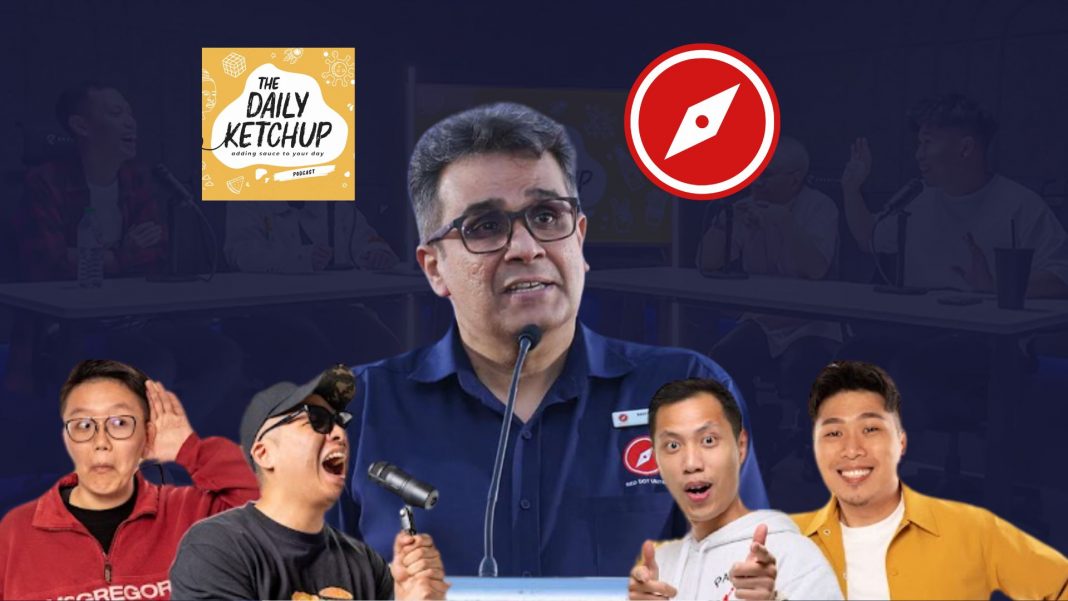SINGAPORE: In his recent appearance on The Daily Ketchup podcast, Red Dot United (RDU) secretary-general Ravi Philemon found himself under the spotlight. What started as a tough grilling on the party’s flagship policy—the Citizens’ Dividend—ended with many viewers shifting their stance in support, swayed by his mix of policy clarity and poignant storytelling.
Ravi’s interview offered more than just campaign promises. It revealed the growing disconnect between Singaporeans and the government’s approach to social welfare, and it shed light on how the opposition parties are being shortchanged even before the votes are cast.
A rigged format: CNA Roundtable leaves opposition in the lurch
Philemon opened with a criticism of the recent CNA Roundtable, where opposition candidates were given just one hour to prepare for policy questions, with each response limited to a one-minute time slot.
“I was expecting a debate,” Ravi said, referencing how past debates—especially those featuring the PAP’s Dr Vivian Balakrishnan—set the standard for robust discourse. “This time, we were just given questions one hour before. No time for prep, and no real debate.”
The format not only stifled meaningful dialogue but exposed the structural bias against opposition parties, which often lack the institutional support and resources the ruling party enjoys.
From food stamps to freedom: Why CDC vouchers miss the mark
Ravi didn’t hold back in his critique of the CDC voucher scheme. Drawing from his decades in social work, he likened the vouchers to America’s food stamps—well-intentioned but ultimately degrading.
“These schemes take away dignity,” he asserted. “If you’re poor, you should be supported, not branded. In the US, people line up [for] food stamps. Here, we get vouchers that say what you can’t buy—no alcohol, no cigarettes. Why are we policing the poor?”
He shared a touching anecdote of a mother with nine children walking three kilometres with groceries because she couldn’t afford transport. He gave her his last $20 for a cab ride, only to later see her smoking a cigarette. “At first I was angry,” he admitted. “But then I realised—this was her holiday. We all decompress. She just didn’t have any other way.”
That story, humanising the choices of the poor, although he did not morally agree with the action, resonated with the hosts and the live audience, many of whom initially questioned the need for universal handouts. By the end, minds had changed.
The Citizen’s Dividend: Redistributing Dignity
RDU’s Citizens’ Dividend proposes a bold yet fiscally responsible vision: a monthly cash payout of $200 to all Singaporeans, funded by annual budget surpluses and modest tax reforms targeting billionaires and mega-corporations. Importantly, it mirrors the funding source for CDC vouchers, without the red tape, stigma, or spending restrictions.
Ravi emphasised that this isn’t a raid on reserves, nor a populist free-for-all. “We’re starting with a $1.3 billion pilot. We’ve done the math,” he said. “We’re not touching the reserves. We’re simply using the same surpluses the government has used to fund CDC vouchers—just returning them as cash instead.”
And yes, the dividend would go to all, including the rich. “It’s an ecosystem,” Ravi explained. “The wealthy will receive it too, but they’ll also pay more into the system through fairer taxes. We’re not asking the rich to sacrifice; we’re asking them to contribute justly.”
Moving beyond short-termism
Ravi also voiced concern that Singapore’s welfare model is increasingly short-sighted.
“CDC vouchers were a response to inflation. If they’re now permanent, then why not just give cash?” he asked, noting that the vouchers are often forgotten, underutilised, or limited to select retailers. “Cash boosts all businesses, not just supermarkets. It gives people the power to decide.”
He pointed out that GST affects the poor far more than the rich. “They say the rich pay more GST. Yes, but from their loose change. For ordinary Singaporeans, GST is paid from what we barely have. That difference matters.”
One of the podcast hosts posed a pressing question: What if Singaporeans use the Citizens’ Dividend across the border in Malaysia, where the exchange rate offers more bang for the buck?
Ravi didn’t dodge the concern—instead, he reframed it.
“That just goes to show,” he responded, “that people can enjoy a better quality of life across the Causeway. What are we doing as a nation?”
His point struck at the heart of Singapore’s cost-of-living crisis. Rather than seeing cross-border spending as a problem, Ravi challenged Singaporeans to reflect on why such a choice is so appealing in the first place. “It should set off alarm bells,” he said. “We need to ask—why is life becoming unaffordable here?”
A generational shift
Despite initial scepticism from younger viewers, Ravi’s authenticity and honesty resonated. His policy explanation was clear. His empathy was real. And his commitment to long-term reform over quick political wins was palpable.
Ravi closed on a personal note: “I’m a father and a grandfather. The question I ask myself every day is—what kind of Singapore am I leaving behind for them?”
By the end of the episode, audience sentiment had visibly shifted. What began as a grilling evolved into a genuine conversation—one that many left feeling hopeful about.

